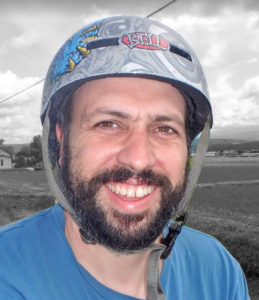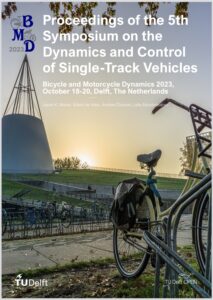Assistant Prof essor Jason Moore has dedicated much of his academic life to understanding the science of bicycle balance, control, and the broader implications for transportation safety and sports performance. As chair of the 5th Symposium on the Dynamics and Control of Single-track Vehicles: Bicycle and Motorcycle Dynamics, he took an innovative approach with an open peer review process. Working closely with TU Delft OPEN Publishing, the conference proceedings have been compiled into an open access book, improving the dissemination of research in this field.
essor Jason Moore has dedicated much of his academic life to understanding the science of bicycle balance, control, and the broader implications for transportation safety and sports performance. As chair of the 5th Symposium on the Dynamics and Control of Single-track Vehicles: Bicycle and Motorcycle Dynamics, he took an innovative approach with an open peer review process. Working closely with TU Delft OPEN Publishing, the conference proceedings have been compiled into an open access book, improving the dissemination of research in this field.
Balance and bikes
Working in the Biomechatronics & Human-Machine Control Group at TU Delft’s Faculty of Mechanical Engineering, how people balance on bicycles is central to Moore’s research. His interest started as a mechanical engineering student, where the bicycle as a machine captured his attention and inspired his research focus. “It’s a very nice scientific platform to understand balance,” says Moore. The three main areas of his work are exploring the mechanics of balance, enhancing transportation safety, and optimising sports performance.
By studying the interactions between people and their bicycles, Moore’s work helps create safer cycling conditions, aiming to reduce falls and road conflicts. In addition, his insights into control mechanisms have applications in sports, such as enhancing cyclists’ speed and efficiency. “I translate these things into sports performance and safety so we can go faster on a bicycle and not injure ourselves.” In 2021, Moore took over the TU Delft Bicycle Lab when founder Dr. Arend Schwab retired, continuing research centred around the science and engineering of bicycles.
Bringing bike experts together
Lacking a centralised forum for discussing the science of bicycles and motorcycles, Schwab and his TU Delft colleague Dr. Jaap Meijaard wanted to bring together academics and researchers in the field. In 2010, they co-founded The Bicycle and Motorcycle Dynamics Conference, hosting the inaugural event in Delft. Now held every three years, the conference is a gathering point for around 150 researchers from the global community. When Schwab retired, he approached Moore about bringing the conference back to Delft and in 2023, Moore chaired the 5th edition of the symposium
Innovation with open peer review
One aspect of the conference that Moore wanted to improve was the dissemination of research. Previously, papers were shared only on a USB stick distributed at the event, limiting access to a small audience. “That always bothered me,” he says. Determined to make the research more accessible, Moore connected with TU Delft OPEN Publishing, and they suggested a unique solution: open peer review. This innovative approach allows each paper to be publicly reviewed in its raw form, with reviewers’ comments visible and revisions tracked from the first to the final version. “Traditionally, all that stuff is behind closed doors,” Moore explains.
The open review model, while not yet widespread, has gained traction in recent years, challenging the traditional culture of private review. Working with the TU Delft Library team, Moore found enthusiastic support for the idea.
Navigating new software
 The implementation of the open peer review process required more than just an idea—it needed software to facilitate a smooth workflow. TU Delft’s Library collaborates with Orvium, a platform designed to handle the complexities of open review. “The workflow is complicated. You often don’t see that on the back end of a publishing machine,” Moore explains. The partnership enabled the team to produce a professional, indexed collection of reviewed papers.
The implementation of the open peer review process required more than just an idea—it needed software to facilitate a smooth workflow. TU Delft’s Library collaborates with Orvium, a platform designed to handle the complexities of open review. “The workflow is complicated. You often don’t see that on the back end of a publishing machine,” Moore explains. The partnership enabled the team to produce a professional, indexed collection of reviewed papers.
It was a learning experience, but Moore points out that the platform’s advantages outweigh any hiccups they encountered. Each paper receives a digital object identifier (DOI) and is indexed in academic databases, lending the collection credibility and making it easy for researchers to include their work in academic records. “Our authors do have concerns,” he acknowledges, noting that professional advancement often hinges on publishing in well-regarded journals. But with the indexed, verified collection, “It’s the real deal,” Moore says. “It’s traceable, and they can show that as a peer-reviewed contribution.” The project ultimately culminated with the papers from the 2023 symposium being compiled into an open-access book.
Transparent science
Moore’s belief in open access is longstanding, having advocated for it since graduate school. For him, publicly funded research should be available to everyone. “Most scientists, including myself, see ourselves as a public good,” he says. However, barriers to open access persist, especially when it comes to proprietary journals. “I think every researcher has faced periods of not getting access to the information that you need to do your work,” he adds. Reflecting on the open peer review process, Moore finds more advantages than disadvantages. “I don’t see any fundamental downsides,” he says. Although full transparency has its challenges, he believes that the benefits of open science—greater collaboration, accessibility, and shared knowledge—far outweigh potential issues.
Successful example
Moore is hopeful that other conferences and research areas will consider open peer review as an alternative to traditional publication. With the experience gained, he’s confident that TU Delft’s process can serve as an example for similar initiatives. “It was a learning process,” he admits, but the collaboration with TU Delft Library made it possible to overcome obstacles and pave the way for future projects. Reflecting on the experience, Moore is grateful for the support TU Delft provided, noting that the Library’s involvement was far more comprehensive than he anticipated. “I didn’t know that TU Delft was going to offer as much support as they did,” he says. “They were great partners and their value added to this process is high.”
